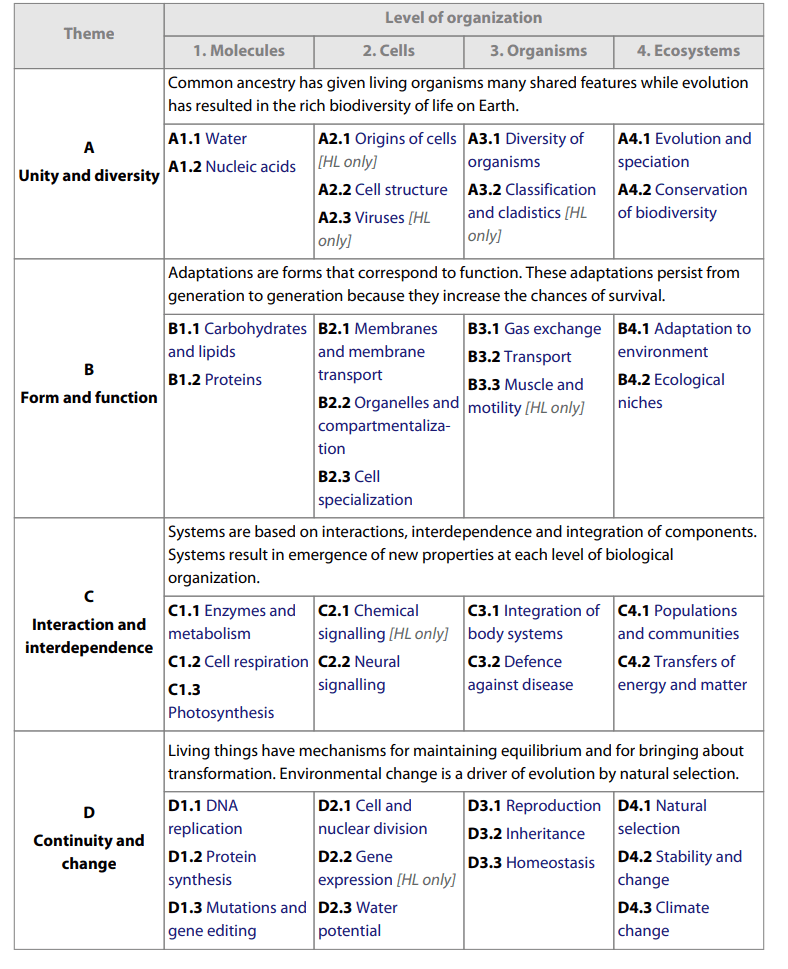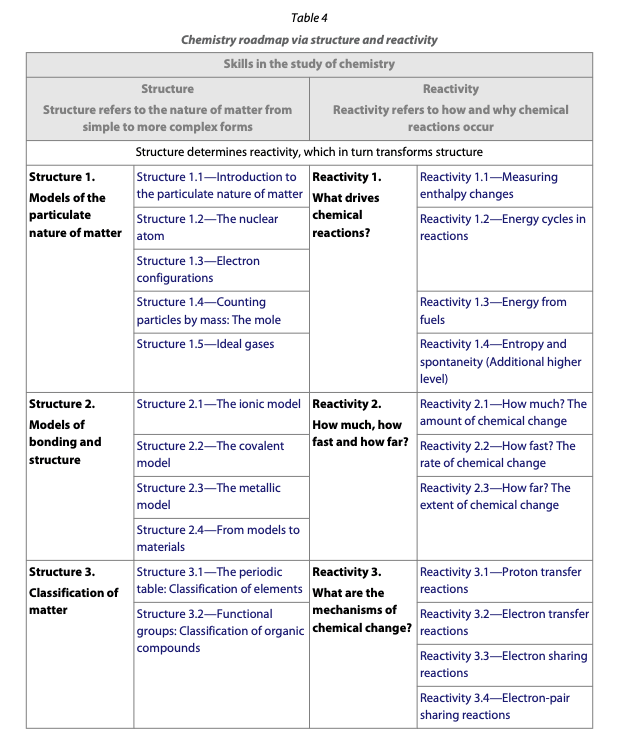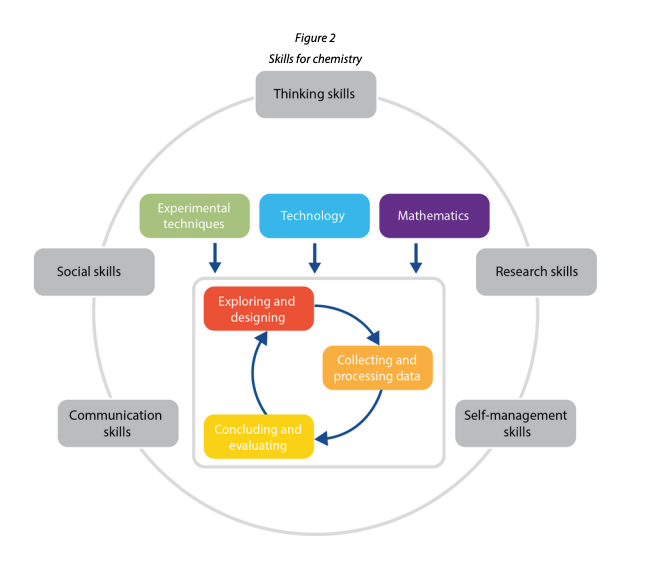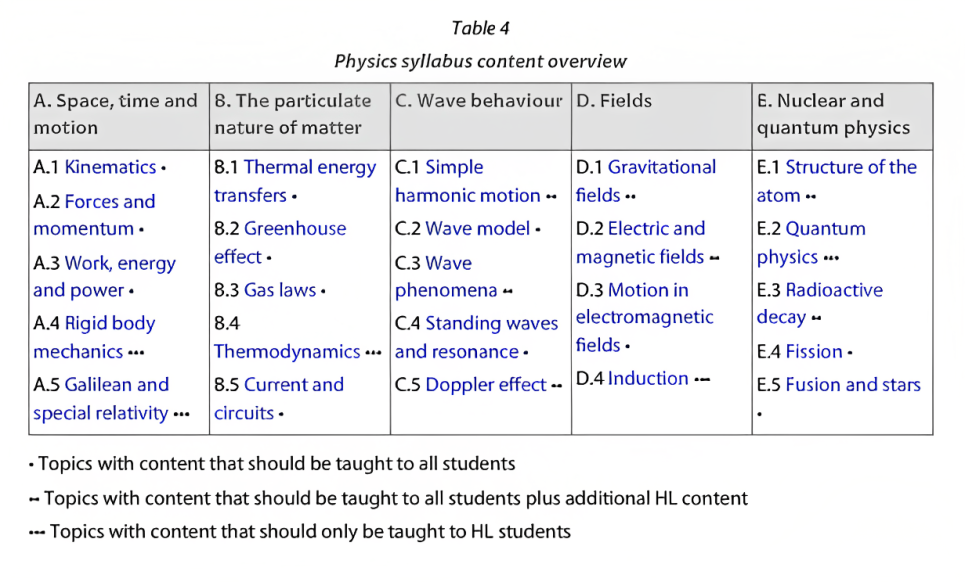
Download IB DP Biology Syllabus Map
Content The content has changed a lot in some places and remained the same in others. The first change you will notice is that the options have been removed; more on this below with assessment changes. Some of the option content has been subsumed, and other content deleted. The Teacher Support Material, coming out in August 2023, will contain a list of additions and deletions. The syllabus statements have become more descriptive so that teachers will now have a better idea of what specifically needs to be taught. The intention is that there will be less implied knowledge than the legacy guide (LA 2024). The “skills in the learning of biology”, which is a descriptive list of skills students need to know, should help clarify what students need to be able to do in the internal assessment and in the data analysis questions on Paper 2. The other big change is the move towards conceptual, networked learning. The IB roadmap, taken from the IB DP Biology guide and shown in Figure 1, provides two possible concept-based pathways, a theme-based sequence and a level of organisation sequence, in which the course could be taught. They DO NOT need to be taught in either order. The IB encourages teachers to create their own roadmaps that match their circumstances and needs. The new organisational structure and changes in the arrangement of the content is to highlight and encourage the development of conceptual knowledge in biology with the intention that this will help with student understanding. Note that both syllabi are currently available in the ManageBac Unit Planner for the transition year, allowing you to switch across any planned units with only a few clicks. Figure 1: The Road Map
Figure 1: The Road Map
About The Author

Download IB DP Chemistry Syllabus Map
When you look at the guide, you will no doubt start looking at the content which has been reordered and put into a roadmap. The roadmap reflects the way that the IB would like you to teach the course. The backbone to this is that they would like you to teach the course conceptually using both the new slimmer Nature of Science statements and the five ATL attributes. The course is split into two broad concepts of ‘Structure’ and ‘Reactivity’ that are then linked by smaller sub-concepts such as S2.1 The Ionic Model or R3.3 Electron Sharing Reactions. Inside each of these smaller sub-concepts there are the syllabus statements that link the concept together. Figure 1: Chemistry Roadmap, Chemistry Guide (FA 2025), IBO, p25.
Figure 1: Chemistry Roadmap, Chemistry Guide (FA 2025), IBO, p25.
 Figure 2: Skills for Chemistry. Chemistry Guide (FA 2025), IB p28
Figure 2: Skills for Chemistry. Chemistry Guide (FA 2025), IB p28
- Research design (6 marks)
- Data analysis (6 marks)
- Conclusion (6 marks)
- Evaluation (6 marks)
About the Author

Download IB DP Physics Syllabus Map
What is there to look forward to? Well, there is a general move to a more interconnected course and towards a more conceptual approach. The old “options” are out. The criteria for the individual investigation have been simplified and there is a new approach for what we will be calling “Physics skills”. The course moves away from the old division into 12 topics plus options and into a neat set of five themes:- Space, Time and Motion
- The Particulate Nature of Matter
- Wave Behaviour
- Fields
- Nuclear and Quantum Physics
 Source: Physics Guide (FA 2025), IB, 2023, p25.
Within each theme there is SL and HL content, clearly differentiated. Within any theme you will find much to recognise from the old course. Some of the old option material has been brought into these new themes, and some of the old SL material has been removed. Although the hours for the whole course remain the same, there is a sense that there is less content to rush through.
An important new addition to the course guide is the “linking questions”. Through these, a web is spun that connects and draws in aspects of the five themes. This aids the drive towards conceptual understanding: now the concepts do not stand alone but are linked, compared and contrasted. The process of comparing and contrasting helps to build what we aim for – conceptual learning. These are found at the end of each section of content in the guide.
You will notice that the old “topic 1” has disappeared. Those more mathematical and data-analysis skills are now incorporated into what is called “Physics skills”. These skills include not only the technical mathematical and numerical-analytical “tools”, but also everything needed for the “inquiry process” which includes designing experiments and explaining findings. In this new course we weave the development of all of these skills into each of the themes. Careful planning will be needed!
Final assessment is similar to the previous model but with just two written papers. (No options so no options paper!). The criteria for the individual investigation are reduced to four categories, each equally weighted.
I hope you will enjoy teaching this new course. With its renewed emphasis on revealing the fundamental concepts, on connecting topics within the course and with some reduction in the wide range of content, I think we are in for good times!
More information on Concept Teaching can be found in our DP Science Concept Guide.
If you would like to brighten up your classroom then there is a nice Physics Concepts Poster you can download from here by the artist Gary Goodwin.
Source: Physics Guide (FA 2025), IB, 2023, p25.
Within each theme there is SL and HL content, clearly differentiated. Within any theme you will find much to recognise from the old course. Some of the old option material has been brought into these new themes, and some of the old SL material has been removed. Although the hours for the whole course remain the same, there is a sense that there is less content to rush through.
An important new addition to the course guide is the “linking questions”. Through these, a web is spun that connects and draws in aspects of the five themes. This aids the drive towards conceptual understanding: now the concepts do not stand alone but are linked, compared and contrasted. The process of comparing and contrasting helps to build what we aim for – conceptual learning. These are found at the end of each section of content in the guide.
You will notice that the old “topic 1” has disappeared. Those more mathematical and data-analysis skills are now incorporated into what is called “Physics skills”. These skills include not only the technical mathematical and numerical-analytical “tools”, but also everything needed for the “inquiry process” which includes designing experiments and explaining findings. In this new course we weave the development of all of these skills into each of the themes. Careful planning will be needed!
Final assessment is similar to the previous model but with just two written papers. (No options so no options paper!). The criteria for the individual investigation are reduced to four categories, each equally weighted.
I hope you will enjoy teaching this new course. With its renewed emphasis on revealing the fundamental concepts, on connecting topics within the course and with some reduction in the wide range of content, I think we are in for good times!
More information on Concept Teaching can be found in our DP Science Concept Guide.
If you would like to brighten up your classroom then there is a nice Physics Concepts Poster you can download from here by the artist Gary Goodwin.
About the author

David Clapp Physics Subject Leader
The Learning Management Digest
Subscribe today to receive our latest resources, events, updates and so much more – specially curated for you, and delivered straight to your inbox.
